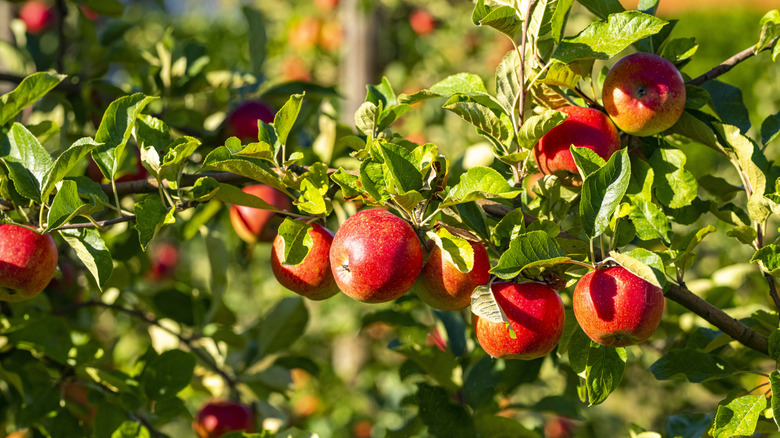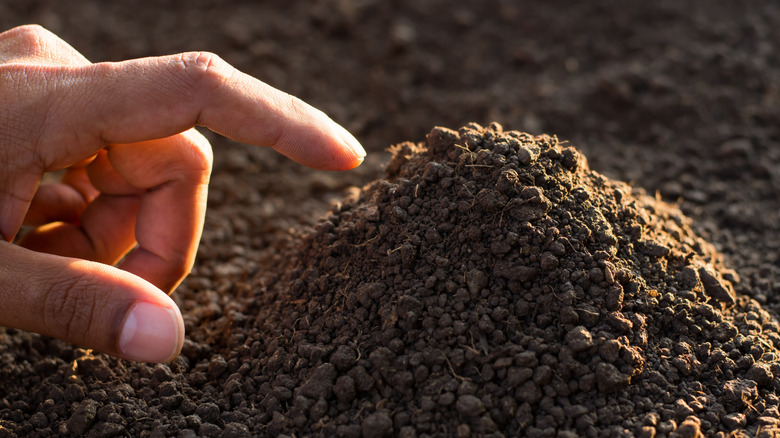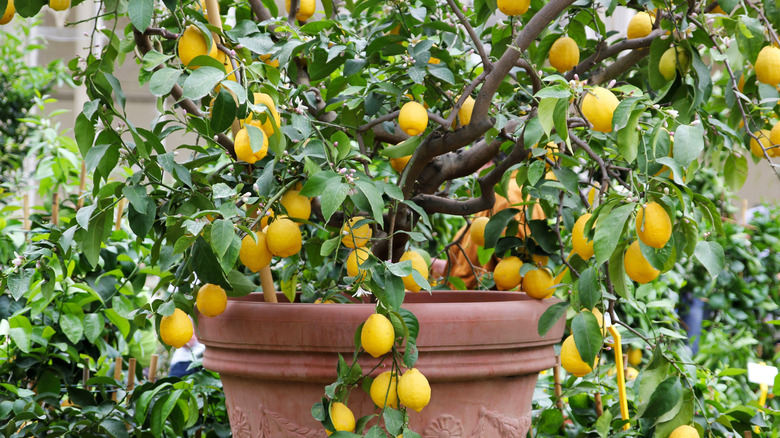The Type Of Soil That Will Help Your Fruit Trees Flourish
We may receive a commission on purchases made from links.
You don't need to live in a warm climate to plant fruit trees in your yard. Beyond citrus, there are tons of fruit trees to choose from that suit a range of climates, including figs, pears, and persimmons, just to name a few. What you do need, though, is the right type of soil. While specifics vary by tree, fruit trees generally require well-draining, loamy soil to flourish and produce fruit.
Healthy soil is essential for fruit tree health because it's way more than just dirt — it also contains organic matter, gas, water, bacteria, fungi, and other living organisms, all of which act as a dynamic ecosystem to provide plants with nutrients, oxygen, and water. In the case of fruit trees, soil that allows free-flowing water and air is essential for keeping the roots healthy.
Loamy soil provides exactly that. The term "loam" refers to the type of particles in the soil. There are three types of particles: sand, silt, and clay. Loam has a balanced mixture of all three. Sand particles are the largest and allow water to drain the most quickly, clay has the smallest particles and holds onto water for the longest, and silt is in between. Since loamy soil balances the three, it's neither too coarse nor too fine, so it's ideal for many plants. It holds onto water as needed, retains nutrients well, and allows oxygen to flow to roots easily. Although perfect soil is ideal, Tiffany Selvey, House Digest's Garden Editor and in-house Master Gardener, tells us, "The goal is to create the best possible soil environment for thriving trees."
How to tell if your soil will support fruit trees
Loamy soils can be further divided into those that have an equal ratio of sand, silt, and clay, and those that lean sandier, siltier, or more clay-rich. Fruit trees often prefer sandy loam, but it depends on the type of tree. For example, cherry, nectarine, and plum trees prefer a sandy loam while quince, mulberry, and apricot thrive in a regular well-draining loamy soil. Dense clay soils can be a challenge, but Selvey states, "Some fruit trees are more tolerant of soil extremes. For example, an apple tree can still thrive in clay soil as long as it has the nutrients it needs and the ground doesn't stay soggy."
Not sure if your soil is suitable for fruit trees? Check the health of your soil before planting. To see if it's loamy in texture, squeeze a ball of it in your fist. If it's loam, it should stay in a ball shape but easily fall apart when poked. If the soil is on the sandy side, adding organic matter to the top after planting can help it retain moisture.
Preferred pH levels also vary, but most are in the slightly acidic range from around 6 to 7.5. To test the pH, gather soil samples and use a test kit from a gardening store. These results can also help guide you to the best fruit trees for your soil. You can adjust the pH of the soil by adding lime to make it more alkaline or adding elemental sulfur, iron sulfate, or aluminum sulfate to make the soil more acidic.
The best soil for fruit trees in raised beds or containers
It's much easier to control the texture, drainage, pH, and nutrient ratios of the soil if you plant fruit trees in a raised bed or container rather than in the ground. So if the soil in your yard isn't already close to ideal for fruit trees, this option is not only less effort, but more likely to yield successful results (and delicious fruit). Weeds are also less likely to be an issue. Keep in mind that fruit trees need to be planted in a hole that is twice as wide as the root ball itself; choose a bed or container that has enough room for growth.
For raised beds, purchase a high-quality topsoil or gardening soil designed for raised beds to add to any existing soil. Testing the soil underneath is still important since it can help you choose which type of soil to add and alert you to any pests that could affect your fruit trees. While you should avoid adding fertilizer during your initial garden soil preparation, you can keep the soil healthy over time by adding organic matter and mulching.
For containers, avoid using gardening soil since it can become compacted. Instead, use a potting soil or mix that is rich in nutrients and has the proper pH for your fruit trees. Some brands, like Dr. Earth and Four Winds, sell specific soils designed for fruit trees or citrus trees that can be used in raised beds or containers.


